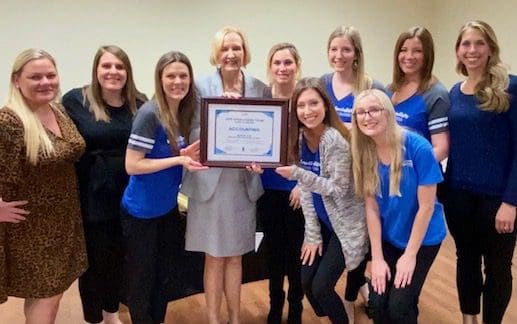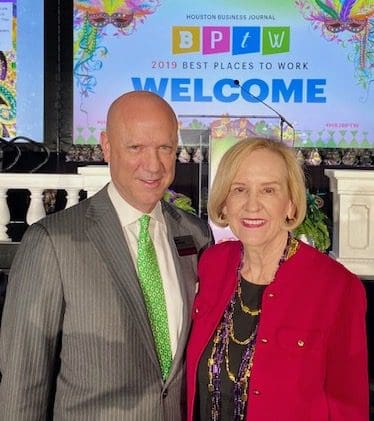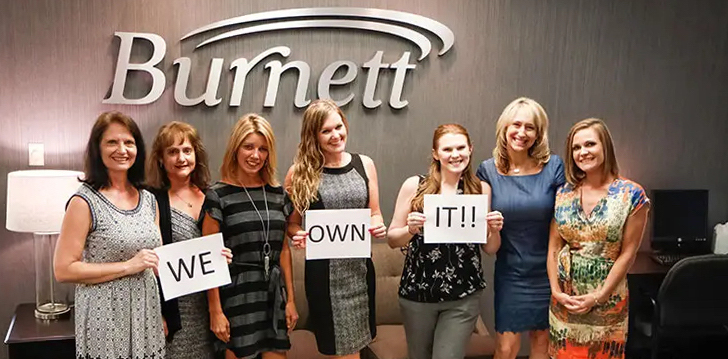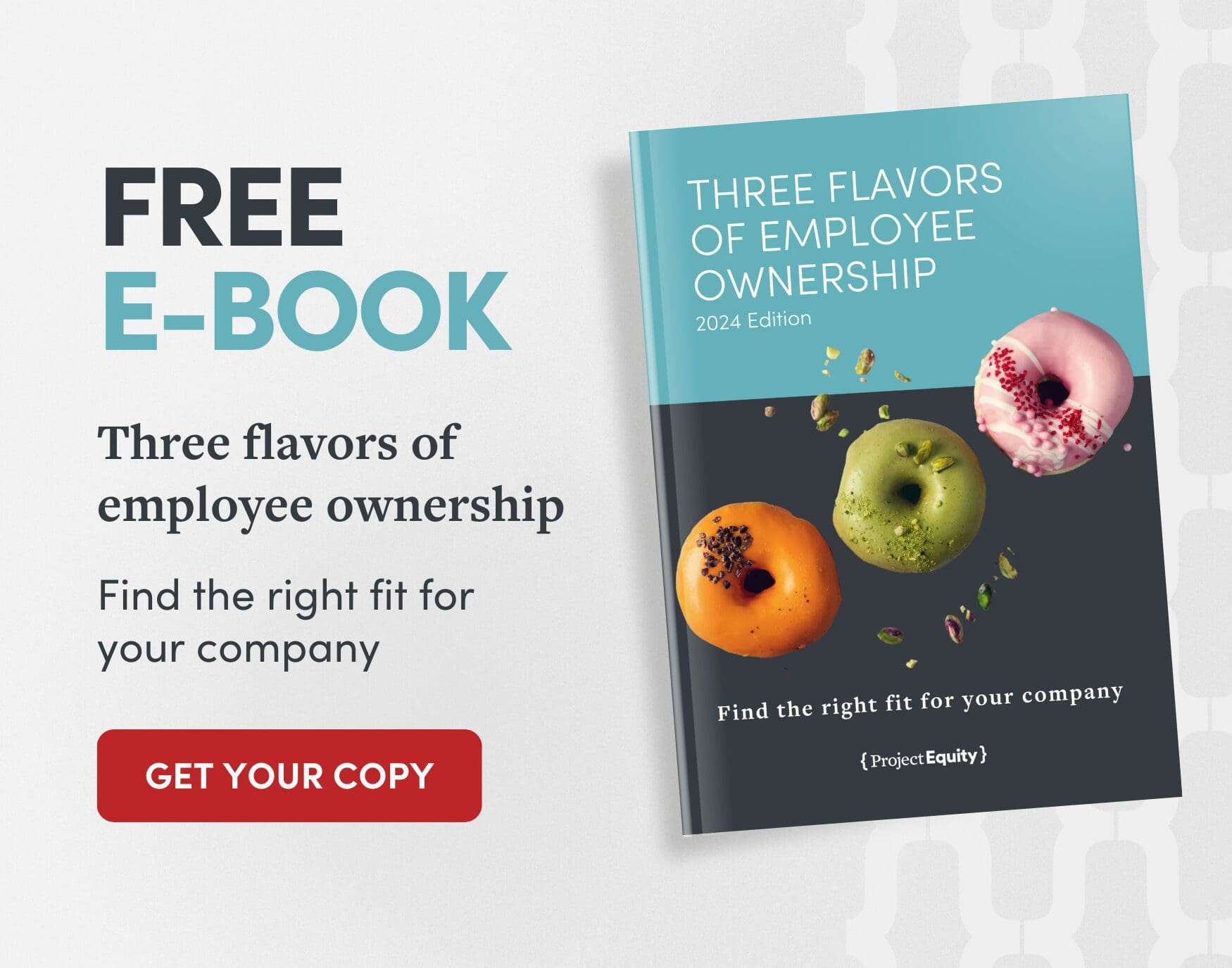Burnett Specialists: The Perfect Solution
From woman-owned to 100% employee-owned
- Texas
This is the story of a company that gambled on itself and won.
Over the last few decades, some industries have embraced employee ownership. Manufacturing, for instance, makes up 22% of all employee-owned companies in America, so owners of manufacturing businesses who are considering employee ownership have plenty of excellent examples to guide them.
Owners in other sectors do not always have the same luxury.
What do you do if you don’t have a roadmap to follow? What do you do when every bit of accepted industry wisdom says you should sell your company to a national firm and walk away, but everything in your heart says otherwise?
The perfect solution
In 2010, Burnett Specialists was thriving, but the long-running management team was growing concerned. Staffing firms tend to be small operations; by the time they reach 10 or 15 years old, many of them sell to the handful of national firms. Burnett Specialists was in its 36th year, and was the largest staffing firm in Texas with offices in the state’s largest markets. That made it an anomaly—a highly desirable one. The offers were rolling in. Owner Sue Burnett had turned down each one so far, but the company had no other succession plan.
“We had seen what happened to other companies,” explained Debbie D’Ambrosio, VP of Risk Management, who started at Burnett Specialists in 1980 thinking it would help her find a job elsewhere, and ended up falling in love with the work. “Everything changes. Your name changes. The culture changes. They might want to keep a few key people, but not everyone. It was very scary, especially to people like me who had been with the company for 30 years.”
For her part, founder and President Sue Burnett had not created a succession strategy primarily because she had no plans to retire anytime soon. But she understood that the time had come to create one, even if only to put her management team at ease. She had no interest in selling to an outside party and seeing the company that bore her name change into something else, potentially at the expense of her employees’ jobs, but she couldn’t see a better option.
Then, Burnett learned about a woman in Missouri who had just sold her staffing business to an Employee Stock Ownership Plan (ESOP). It was the first time she had heard of a staffing firm becoming employee-owned. She spoke to the woman and her ESOP advisors, but they could only provide limited information. The sale had just been completed, and it was the first time the advisors had worked with a staffing company.
No one could say what an ESOP could mean for a staffing firm in the long term. There was no roadmap to follow, no proof of concept. It would be a gamble—an expensive one, given the costs to put an ESOP in place. But to Burnett, the benefits far outweighed the risks.
“To me, this was the perfect solution,” she said. “I could transfer ownership of my stock in the company to my staff. I could be paid for what my company was worth. The company gets to take advantage of the tax breaks. I could keep my job, and no one in the company would be let go. Everything would continue exactly the way it was, except that the employees would become owners, and they would be able to have this benefit for their retirement.”
Burnett Specialists became 100% employee-owned in 2010.
Today, they are the 18th largest ESOP in America.
Her mind was made up. Like many business owners, once Burnett had committed to a course of action, she wanted to put it into practice right away. On Christmas Eve, 2010, Burnett Specialists became 100% employee-owned. Today, the National Center for Employee Ownership ranks them as the 18th largest ESOP in America.
Risks and rewards
Sue Burnett did not start her company with the intent of one day selling it to her employees. In fact, she never intended to get into the staffing business in the first place. Her journey to becoming an industry pioneer, like the journey of the company she created, can be plotted on a timeline of risks.
She took a risk in 1970, when she moved from Little Rock, AR to Houston, TX with a degree in journalism, $500, and a room waiting for her with a friend’s sister-in-law, whom she had never met.
She took a risk when she decided to try her hand at staffing. She had no job leads when she moved to Houston, so she went to a staffing agency for help. The personnel consultant she met told her that she could have a bright future—as a personnel consultant.
It wasn’t the sort of work she had moved to Texas to find. And it was 100% commission-based, so there was no safety net if she struggled. But helping people find jobs sounded like meaningful and fulfilling work. “I called my father and said, ‘what do you think?’ He told me, ‘If it doesn’t work out, at least you’ll know where the jobs are.’”
She gave it a shot. Within six months, she was a manager.
She took a risk in 1974, when she put up her car as collateral to get a $10,000 loan to start her own staffing firm. America was in the grips of a recession; few companies were hiring. Burnett persevered.
In the 70s, when most staffing firms were exclusively focused on filling permanent positions, Burnett took a risk by breaking with the accepted industry wisdom and starting a division to focus on temporary work.
Today they have hundreds of temporary workers on their payroll at any given time, and over 600 of these staffing employees are vested owners in the ESOP. Their long-running expertise in temporary staffing proved invaluable during the COVID-19 pandemic, when there was a need for new, temporary positions like temperature checkers and vaccination appointment setters.
So, becoming employee-owned was not the first instance of Burnett Specialists forging their own path, only the latest.
“It’s not my company anymore. It’s yours.”
Immediately after the sale to the ESOP was finalized, Burnett began the work of building a culture of employee ownership. She traveled to each of the company’s offices to sit down with the employees in person and explain that they were now owners. She launched an education committee to help teach the employee-owners about this new benefit, what it meant for them and for the company. She began holding monthly meetings to share the company’s financials in order to create transparency, and hosting company events each summer to celebrate the stock price. Still, it took time for the impact to sink in.

“It was a very long period before anyone really understood what the ESOP was,” said Burnett. “Most of them have admitted to me later that they really didn’t think it would ever amount to anything. But it has. It’s amounted to a lot, for a lot of people.”
The turning point came after the ESOP had been in place for three years, when employee-owners started to become fully vested. That was when people started looking at their benefit statements and understanding what employee ownership could mean for them.
“We celebrate when people become vested owners,” Burnett said. “We have company meetings twice a year. We say, ‘All the vested owners, please stand.’ Well, 75% of the room stands up. I make a big deal out of that.”
It should come as little surprise that since Burnett’s employee-owners started becoming fully vested and paying even greater attention to their ownership status, the company has thrived. They paid Burnett in full for the sale of the company six months ahead of schedule. When the company rewrote their core values a few years ago, the first value the employee-owners chose to list was: “We own it.”
Whatever it takes
The strong culture of employee ownership at Burnett Specialists was critical when the COVID-19 pandemic struck. The spring of 2020 was one of the most challenging periods in the history of Burnett Specialists. It is worse than anything they faced in the Great Recession of 2008-09, and comparable only to the oil crash of 1986, when the plummeting price of oil caused unemployment in Houston to shoot up to 12.5%.
“We had a very good January and February,” Burnett said of 2020. “And then it was like someone turned out the light. It was the first time we’ve lost money three months in a row in 30 years.”
By March, Burnett could tell that the company would have to cut millions of dollars in costs if they were going to survive, which meant unavoidable job losses. Because she had worked so hard to build a culture of transparency around the company’s financials and direction, the employee-owners were quick to adapt to the severity of the situation and unite around protecting the longevity of the business.
Twenty-five of the employee-owners approached Burnett and volunteered to take cuts to their salaries to help the company through the lean times ahead. Burnett cut her own salary by 80%.
All the reduced salaries have since been restored to their full amounts.
Resiliency and employee ownership
The pay cuts at Burnett Specialists are in line with recent findings from the Employee Ownership Foundation and the Institute for the Study of Employee Ownership and Profit Sharing at Rutgers.
They examined ESOP companies during the COVID-19 pandemic and found that they were less likely overall to implement pay cuts than traditionally-owned companies, but when they did cut pay, those cuts were often larger because managers and senior staff took pay cuts alongside lower level staff.
“They understood right away,” Burnett said. “They said, ‘Do whatever it takes.’ They had an owner’s mentality about it.”
Taking swift action helped Burnett Specialists make it through those difficult months with their stock value intact, and allowed them to recover quickly as the summer arrived and businesses began hiring again.
The biggest gambles
There is a symmetry to Burnett’s story that can only be appreciated with the perspective of time. She took a chance on the staffing business in 1970 and ended up owning her own staffing firm.
Forty years later, she took a chance on employee ownership and turned hundreds of other people into owners of a staffing firm, as well.
Burnett has no doubt that being employee-owned gave the company an advantage during the COVID-19 crisis. Not only were the employee-owners united in doing what needed to be done to stay afloat, but the company was also able to take advantage of the tax savings from their ESOP.
Tax Advantages of ESOPS
Because ESOPs are qualified retirement plans, companies can receive tax deductions for contributions they make to them, creating a source of cash flow.
In addition, S Corporations that are at least 30% ESOP-owned can reduce their federal, and, in most cases, state income taxes. If they are 100% ESOP-owned, like Burnett Specialists, they can eliminate those income taxes entirely.
“Those benefits really can’t be overstated,” Burnett said.
She is quick to caution other business owners to put in their due diligence about employee ownership and to learn all they can about the structure and the costs. They should understand that the impact may not happen overnight and that their employees might not immediately grasp the significance.

“We tell new people to think of it as a gift,” said D’Ambrosio. “We were given the gift of ownership. We try to help them understand the beauty of doing well and sharing that with everyone around them.”
Burnett still marvels at her own decision to leap into employee ownership with so little information. But looking back, she wouldn’t change a thing.
“I just kind of plunged in and didn’t really know what I was getting into,” she said. But sometimes the biggest leaps you take are the ones that work out the best.”
Ownership story details
Transitioned
Not applicable
Employees
Not applicable
Industry
Type of EO
Topic
Not applicable


